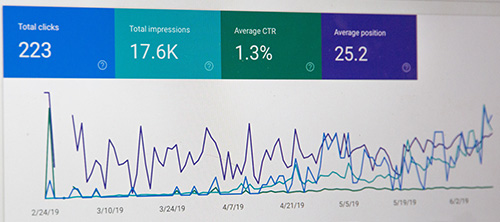
Introduction:
In today’s digital age, where online presence reigns supreme, the importance of Search Engine Optimisation (SEO) for businesses cannot be overstated. It’s not just about having a website; it’s about making sure your website is easily discoverable by search engines and, more importantly, by potential customers.
In this article, we’ll delve into the myriad ways SEO can significantly improve your business, particularly for small enterprises.
How Can SEO Improve Your Business?
Search Engine Optimisation acts as the cornerstone of your online marketing efforts. It goes beyond merely increasing your website’s visibility on search engine results pages (SERPs). Let’s explore some key ways SEO can breathe new life into your business:
1. Enhanced Visibility and Organic Traffic: Imagine your website as a well-kept secret. SEO helps unveil that secret, putting your website in front of users actively searching for products or services you offer. The higher your website ranks on SERPs, the more likely users are to click on it, resulting in a steady flow of organic traffic.
2. Credibility and Trust: People inherently trust search engines. When your website appears on the first page of a search result, users perceive it as a credible and trustworthy source. SEO not only improves your ranking but also fosters a sense of authenticity that customers look for in businesses.
3. Cost-Effective Marketing: SEO is a cost-effective strategy compared to traditional marketing methods. It targets users who are already interested in your industry, saving you from spending resources on reaching an uninterested audience.
4. Higher ROI: The efforts you invest in SEO tend to have a higher return on investment (ROI) over time. A well-optimized website continues to attract organic traffic and generate leads long after the initial Optimisation work is done.
5. Improved User Experience: SEO involves optimising various elements of your website, such as page speed, mobile-friendliness, and user navigation. These improvements create a seamless and enjoyable experience for visitors, encouraging them to stay longer and explore more.
Why Is SEO Essential for Your Small Business?
For small businesses, establishing a strong online presence is often a make-or-break factor. Here’s why SEO should be at the forefront of your business strategy:
1. Levelling the Playing Field: SEO allows small businesses to compete with larger enterprises on a global scale. With the right Optimisation techniques, your website can outrank big players, giving you a fighting chance in the digital arena.
2. Local Search Visibility: Small businesses heavily rely on local customers. optimising your website for local SEO ensures that your business pops up when nearby users search for relevant products or services. This targeted approach can lead to increased foot traffic and conversions.
3. Building Brand Awareness: SEO goes hand-in-hand with brand building. When your website consistently appears in search results, users become familiar with your brand. Over time, this exposure can translate into brand loyalty and repeat customers.
4. Cost-Efficient Advertising: Small businesses often have limited marketing budgets. SEO offers a cost-efficient way to market your products or services without breaking the bank. It reaches users actively looking for what you offer, maximizing the impact of your marketing spend.
5. Long-Term Growth: SEO is not a quick-fix solution; it’s a long-term investment. By steadily climbing the search result ranks, your small business can achieve sustainable growth and a steady stream of leads, all without the constant need for high advertising expenditures.

What Is the Impact of SEO on Business?
The impact of SEO on businesses can be profound and far-reaching. Let’s delve into some key areas where SEO leaves its mark:
1. Increased Website Traffic: SEO’s primary goal is to drive organic traffic to your website. The higher your website ranks on search engines, the more clicks and visits it receives, ultimately leading to enhanced brand exposure and potentially more conversions.
2. Better User Experience: SEO involves optimising your website’s user experience, making it easier for visitors to navigate, find information, and engage with your content. This seamless experience can turn casual visitors into loyal customers.
3. Lead Generation: A well-optimised website tends to attract more leads. When users find your website through relevant search queries, they are more likely to be interested in your offerings, leading to higher conversion rates.
4. Insightful Analytics: SEO tools provide valuable insights into user behaviour, preferences, and demographics. These analytics can help you refine your marketing strategies, target specific audiences, and tailor your content to meet customer needs.
5. Competitive Edge: In today’s competitive landscape, businesses that invest in SEO gain a significant advantage. Outranking your competitors on search engines can establish your authority in the industry and attract a larger share of the market.
How Does SEO Improve Your Website?
SEO works its magic by optimising various aspects of your website. Here’s how it contributes to the overall improvement of your online platform:
1. Keyword Optimisation: SEO involves researching and incorporating relevant keywords into your website’s content. This ensures that your website appears in search results when users enter these keywords, driving targeted traffic.
2. Quality Content: Engaging, informative, and relevant content is the backbone of SEO. Creating high-quality content not only attracts users but also encourages other websites to link to yours, boosting your website’s authority.
3. Technical Enhancements: SEO involves technical Optimisations, such as improving page speed, mobile responsiveness, and site structure. These enhancements contribute to a smoother user experience and higher search rankings.
4. Link Building: Building a network of high-quality inbound and outbound links helps search engines understand your website’s credibility and relevance. This, in turn, boosts your website’s ranking potential.
5. Local SEO: For businesses with physical locations, local SEO ensures that your website appears in local searches, driving foot traffic to your storefront.

Practical Applications of SEO for Your Business
In the previous section, we explored the foundational aspects of SEO and how it can impact your business. Now, let’s dive into the practical applications of SEO and how you can implement these strategies to improve your website’s performance and drive business growth.
1. Content is King
One of the cornerstones of effective SEO is producing high-quality, relevant, and engaging content. Regularly updating your website with fresh, informative content not only attracts visitors but also keeps them coming back for more. Blog posts, articles, infographics, and videos can all contribute to a well-rounded content strategy that resonates with your target audience.
2. On-Page Optimisation
On-page Optimisation involves optimising individual web pages to rank higher and earn more relevant traffic. This includes optimising meta tags (title, description, and headings), using descriptive URLs, and incorporating relevant keywords naturally within your content. By structuring your content effectively, you enhance both user experience and search engine crawlability.
3. Technical SEO
Technical SEO focuses on the behind-the-scenes elements that affect your website’s visibility. This includes optimising your site’s structure, improving page loading speed, and ensuring mobile responsiveness. A technically sound website not only provides a better user experience but also signals to search engines that your site is reliable and trustworthy.
4. Local SEO
For businesses with physical locations, local SEO is a game-changer. optimising your website for local searches involves creating and optimising Google My Business listings, generating local citations, and encouraging customer reviews. When potential customers search for products or services in their vicinity, your business will be front and centre, increasing the likelihood of conversions.
5. Backlink Building
Earning high-quality backlinks from authoritative websites is a crucial aspect of off-page SEO. These backlinks serve as endorsements of your website’s credibility and relevance. Engage in guest posting, influencer outreach, and social media sharing to naturally attract valuable backlinks that boost your search rankings.
6. User Experience (UX) Enhancement
User experience plays a pivotal role in SEO success. A user-friendly website that loads quickly, is easy to navigate, and provides valuable information creates a positive impression on both visitors and search engines. Focus on intuitive design, clear calls-to-action, and a seamless checkout process for e-commerce sites.
7. Regular Monitoring and Adaptation
SEO is an ongoing process that requires continuous monitoring and adaptation. Regularly analyse your website’s performance using tools like Google Analytics and Search Console. Track keyword rankings, traffic trends, and user behaviour to identify areas for improvement and adjust your strategy accordingly.
8. Social Media Integration
While not a direct ranking factor, social media integration complements your SEO efforts. Engaging on social platforms not only helps build brand awareness but also encourages social sharing, which can lead to more backlinks and increased visibility.
9. Stay Abreast of Algorithm Changes
Search engine algorithms are constantly evolving, impacting how websites are ranked. Stay informed about algorithm updates and industry trends to ensure your SEO strategies remain effective. Adapting to algorithm changes promptly will help you maintain your search rankings and stay ahead of the competition.
Conclusion:
In conclusion, SEO is not just a buzzword; it’s a fundamental strategy that can propel your business to new heights. By enhancing visibility, credibility, and user experience, SEO lays the foundation for long-term success. Small businesses, in particular, stand to gain immensely from the advantages SEO brings, enabling them to compete, thrive, and carve a niche in the digital landscape.
Incorporating SEO into your business strategy is no longer an option—it’s a necessity. By understanding the practical applications of SEO and implementing them effectively, you can create a robust online presence, attract organic traffic, and establish your brand’s authority in the digital realm. Remember, SEO is a long-term investment that pays dividends over time, contributing to sustained growth and success for your business.
As you embark on your SEO journey, keep in mind that the landscape is dynamic. Stay curious, keep learning, and be open to embracing new techniques to ensure your business thrives in the ever-evolving digital world.
For a free 30 minute consultation please book an appointment here, I look forward to discussing how I can help improve your website.
Martin Vincent
SEO Consultant
marketingsuccess4u.co.uk
info@marketingsuccess4u.co.uk
Tel: 01273 956443

